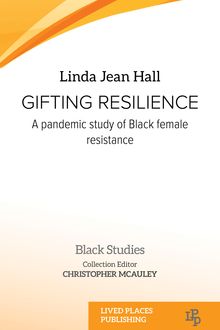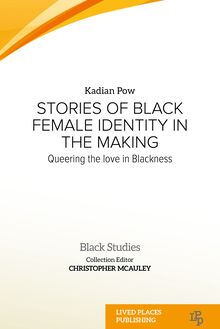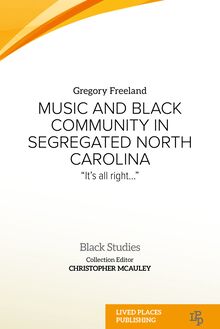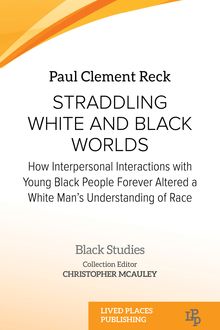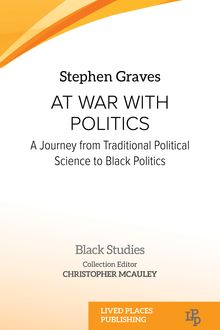-
 Univers
Univers
-
 Ebooks
Ebooks
-
 Livres audio
Livres audio
-
 Presse
Presse
-
 Podcasts
Podcasts
-
 BD
BD
-
 Documents
Documents
-
- Cours
- Révisions
- Ressources pédagogiques
- Sciences de l’éducation
- Manuels scolaires
- Langues
- Travaux de classe
- Annales de BEP
- Etudes supérieures
- Maternelle et primaire
- Fiches de lecture
- Orientation scolaire
- Méthodologie
- Corrigés de devoir
- Annales d’examens et concours
- Annales du bac
- Annales du brevet
- Rapports de stage
La lecture à portée de main
Vous pourrez modifier la taille du texte de cet ouvrage
Découvre YouScribe en t'inscrivant gratuitement
Je m'inscrisDécouvre YouScribe en t'inscrivant gratuitement
Je m'inscrisEn savoir plus
Vous pourrez modifier la taille du texte de cet ouvrage
En savoir plus

Description
How does fear – deep, ongoing, systemic fear – impact on Black lives?
Through reflections on her own life, anthropologist Dr Linda Jean Hall PhD draws on traditions of African storytelling to explore the question of how systemic fear affects the twentieth- and twenty-first-century Afro American experience. By using the framing of pandemic waves – a concept all too familiar in the wake of COVID-19 – Hall employs a personal lens to parse out the implications of different “waves of fear" through impactful stages of her life, allowing readers to examine the shifting relationships that define Blackness and survival.
Gifting resilience: A pandemic study of Black female resistance is ideal reading for students of Black studies, African American studies, and related courses, as well as for students of feminist and womanist studies, gender studies, cultural studies, history, sociology and anthropology. Unflinchingly honest, this book gives a human face to viewpoints and ideas that originate deep within the complex and diverse African Diasporic lived experience.
0: Introduction
Part I: The germinal moment—speaking from uncertainty
Chapter 1 Writing incentives and logic
Chapter 2: A marriage and escape
Chapter 3: Walking in the shadows
Part II: Knoxville’s HBCU
Chapter 4: An unwelcoming precursor
Chapter 5: Afro American?
Chapter 6: White supremacy and Black power
Chapter 7: American dreams and nightmares
Chapter 8: Familial ties and male companions
Chapter 9: Social climbing to the bottom
Chapter 10: Marginalization in Knoxville
Chapter 11: Employment success and love’s reality
Chapter 12: The secrets of Vietnam
Part III: Low man on the totem pole
Chapter 13: 1970s underemployment opportunities
Chapter 14: Marijuana and the social welfare system
Chapter 15: Speaking truth to power
Part IV: Alone
Chapter 16: A hollow marriage
Chapter 17: Tennis and the Jehovah’s Witnesses
Part V: The Big Blue nightmare
Chapter 18: Precariousness and professional dreams
Part VI: Failure and being “the best”
Chapter 19: Gender, race, and bullying
Chapter 20: Dismissal and retribution
Chapter 21: Parental demands and divorced Black womanhood
Chapter 22: Guilt, marriage, and success
Chapter 23: Avoiding hate while failing miserably
Part VII: California here I come
Chapter 24: Golden State ambitions and insecurities
Chapter 25: Compassion and friendship networks
Chapter 26: Opportunities requiring closure
Part VIII: Death and degrees
Chapter 27: Inevitable mortality and project completion
Part IX: Master’s nightmares and doctoral dreams
Chapter 28: Academic achievement from a historically marginalized perspective
Chapter 29: Parental heartache overshadows success
Chapter 30: Conclusion
Sujets
Informations
| Publié par | Lived Places Publishing |
| Date de parution | 22 septembre 2022 |
| Nombre de lectures | 0 |
| EAN13 | 9781915271594 |
| Langue | English |
Informations légales : prix de location à la page 0,1250€. Cette information est donnée uniquement à titre indicatif conformément à la législation en vigueur.
Extrait
Gifting Resilience
Dr Linda Jean Hall
Gifting resilience
A Pandemic Study of Black Female Resistance
The Black Studies Collection
Collection Editor
Dr Chris McAuley
First published in 2022 by Lived Places Publishing.
All rights reserved. No part of this publication may be reproduced, stored in a retrieval system, or transmitted in any form or by any means, electronic, mechanical, photocopying, recording or otherwise, without prior permission in writing from the publisher.
The authors and editors have made every effort to ensure the accuracy of information contained in this publication, but assume no responsibility for any errors, inaccuracies, inconsistencies or omissions. Likewise, every effort has been made to contact copyright holders. If any copyright material has been reproduced unwittingly and without permission the Publisher will gladly receive information enabling them to rectify any error or omission in subsequent editions.
Copyright © 2022 Lived Places Publishing
British Library Cataloguing in Publication Data
A CIP record for this book is available from the British Library
ISBN: 9781915271570 (pbk)
ISBN: 9781915271587 (ePDF)
ISBN: 9781915271594 (ePUB)
The right of Linda Jean Hall to be identified as the Author of this work has been asserted by her in accordance with the Copyright, Design and Patents Act 1988.
Cover design by Fiachra McCarthy
Book design by Rachel Trolove of Twin Trail Design
Typeset by Newgen Publishing UK
Lived Places Publishing
Long Island
New York 11789
www.livedplacespublishing.com
Abstract
Through reflections on her own life, anthropologist Dr Linda Jean Hall PhD draws on traditions of African storytelling to explore the question of how systemic fear affects the twentieth- and twenty-first-century Afro-American experience. By using the framing of pandemic waves—a concept all too familiar in the wake of COVID-19—Hall employs a personal lens to parse out the implications of different “waves of fear” through impactful stages of her life, allowing readers to examine the shifting relationships that define Blackness and survival.
Keywords
African American; feminist; anthropology; autobiography; critical race theory; resilience; fear; structural racism; gender; intersectionality
Preface
Within the pages of this work, there is a combined communication from several marginalized generations that only slowly came to life over a period of years. The writing project ebbed and flowed while the challenge remained constant—to give existential meaning to a multi-decade lived experience that was destined to be forgotten. Too frequently, I found countless excuses to avoid any engagement with a manuscript that brought me so much pain. This is finally a published work because friends and family refused to accept even valid excuses that I offered to justify its incompleteness. The ceaseless reminders and a pandemic-driven awareness of social distance and impending death resulted in the conversion of an autoethnography—a personal analysis—to a message in a bottle for future generations.
A note on language
Regarding the capitalization of “Black”, I concur with Mike Laws (2020), a copy editor with the Columbia Journalism Review , who argues that “we capitalize Black, and not white, when referring to groups in racial, ethnic, or cultural terms. For many people, Black reflects a shared sense of identity and community. White carries a different set of meanings; capitalizing the word in this context risks following the lead of white supremacists.” The capitalization of the people’s group Black is also standard practice at leading style guides including The Chicago Manual of Styles and The Diversity Style Guide . In this book, capitalizing “Black” serves as an act of empowerment and a demand for universal recognition of the systematic displacement of ethnic identities associated with the enslavement of peoples of the African Diaspora.
The storytelling approach of this work employs a common Afro-American vernacular when referring to particular ethnic groups as “Blacks” and “whites”, as opposed to using one of the heavily debated descriptive terms for collectives in the social sciences such as “Black people”; “Black communities”; “white people”; and so on.
Contents
Introduction xii
Learning objectives xxv
Part I The germinal moment—speaking
from uncertainty
Chapter 1 Writing incentives and logic
3 Chapter 2 A marriage and escape
9 Chapter 3 Walking in the shadows 17
Part II Knoxville’s HBCU
Chapter 4 An unwelcoming precursor
23 Chapter 5 Afro-American?
27 Chapter 6 White supremacy and Black power
35 Chapter 7 American dreams and nightmares
53 Chapter 8 Familial ties and male companions
61 Chapter 9 Social climbing to the bottom
69 Chapter 10 Marginalization in Knoxville
73 Chapter 11 Employment success and love’s reality
85 Chapter 12 The secrets of Vietnam 93
Part III Low man on the totem pole
Chapter 13 1970s underemployment opportunities 103
Chapter 14 Marijuana and the social welfare system
109 Chapter 15 Speaking truth to power 115
Part IV Alone
Chapter 16 A hollow marriage
129 Chapter 17 Tennis and the Jehovah’s Witnesses 137
Part V The Big Blue nightmare
Chapter 18 Precariousness and professional dreams 145
Part VI Failure and being “the best”
Chapter 19 Gender, race, and bullying
153 Chapter 20 Dismissal and retribution
159 Chapter 21 Parental demands and divorced Black
womanhood
165 Chapter 22 Guilt, marriage, and success
171 Chapter 23 Avoiding hate while failing miserably 177
Part VII California, here I come
Chapter 24 Golden State ambitions and insecurities
189 Chapter 25 Compassion and friendship networks
201 Chapter 26 Opportunities requiring closure 209
Part VIII Death and degrees
Chapter 27 Inevitable mortality and project completion 217
Part IX Master’s nightmares and doctoral dreams
Chapter 28 Academic achievement from a historically
marginalized perspective
225 Chapter 29 Parental heartache overshadows success
237 Chapter 30 Conclusion 245
Suggested discussion topics 252
References 253
Further reading 254
Index 257
Introduction
I don’t know why I’m so scared all the time. I just wish I could say that this is a new feeling. Or is it? The only thing that I do know is that the pandemic didn’t help. I am now genuinely afraid of anyone with whom I suspect that I don’t share a political viewpoint. At the top of my list are those unmasked millions and their unvaccinated cousins. Both have proven through their actions—or lack of caring—that they are my mortal enemies. I pay a heavy price each day to be able to carry this much hate and suspicion. It has made me content to be alone, and cautious about doing just about anything that will require me to have contact with anyone I do not know. I am the antithesis of my former self, the brave world traveler. Instead, I am now devoid of any desire to extend my life beyond a 12-mile radius of my apartment.
Accompanying my fear of others is what I know from former experiences to be the sense that I’m slowly developing some form of mental illness. In the past, during my “unwanted” childhood and as an adult member of a historically marginalized minority, I only responded with positivity to the countless confrontations I had with very hurtful people. Then, the immersion into despondency that came from these confrontations only served to rejuvenate my spirit. In this book, I revisit some of these events to ask why it is imperative that I liberate myself from the COVID-19 legacy of distrustfulness and partisanship.
Motivation: An intersection of the personal and professional
Any analysis must begin with a close look at the present; in this
case, who I am today. Professionally, I am an optimistic anthropologist who focuses on positive outcomes to gaining knowledge through daily events such as success . The foundation of my work builds on a strong argument by fellow anthropologist Setha Low ( 2009 ). I share her opinion, and research and teach from the standpoint that truthful language and actions produce a “lived experience, and as a center of agency, a location for speaking and acting on the world” (p. 26). Low opened the door for me to embrace and study acts of compassion and veracity. For the first two months of 2020, the direction of my career as an independent researcher was solidly grounded in Low’s erudite counsel to place emphasis on positive outcomes. When the epidemic created a culturally ubiquitous event—a coming-to-hatred moment—I was in the initial stages of developing a project to explore the retention of minority students at the University of California Riverside and California Polytechnic University Pomona.
The advancement of this organization was halted when the virtual atmosphere of social separation prevented a necessary evolution of the central committee’s cohesiveness. At the time of writing it is 2022, and for the past two years, societal uncertainty and division continue to be factors that define a coupling of unpredictability of the coronavirus with a pre-existing and more intensified climate of political anxiety. The prevailing milieu, marked by the reconstitution of primal social inequities and the associated increase in avarice, dictated detachment from and the rampant politicization of a plethora of issues that continue to shape our daily lives. Too many of us are overwhelmed by the struggle to identify which side we are on. When I read posts on social media, I realize that I’m like so many of my fellow pandemic survivors; my spirit is broken in a way I have never experienced before. Each day, the lack of socialization requires that I deconstruct my former life while asking what precipitating events facilitated the formation of my new hate -centric identity. The best place to begin a search for an answer to this question is to identify several key events that shaped my youth and early adult years.
Two d
-
 Univers
Univers
-
 Ebooks
Ebooks
-
 Livres audio
Livres audio
-
 Presse
Presse
-
 Podcasts
Podcasts
-
 BD
BD
-
 Documents
Documents
-
Jeunesse
-
Littérature
-
Ressources professionnelles
-
Santé et bien-être
-
Savoirs
-
Education
-
Loisirs et hobbies
-
Art, musique et cinéma
-
Actualité et débat de société
-
Jeunesse
-
Littérature
-
Ressources professionnelles
-
Santé et bien-être
-
Savoirs
-
Education
-
Loisirs et hobbies
-
Art, musique et cinéma
-
Actualité et débat de société
-
Actualités
-
Lifestyle
-
Presse jeunesse
-
Presse professionnelle
-
Pratique
-
Presse sportive
-
Presse internationale
-
Culture & Médias
-
Action et Aventures
-
Science-fiction et Fantasy
-
Société
-
Jeunesse
-
Littérature
-
Ressources professionnelles
-
Santé et bien-être
-
Savoirs
-
Education
-
Loisirs et hobbies
-
Art, musique et cinéma
-
Actualité et débat de société
- Cours
- Révisions
- Ressources pédagogiques
- Sciences de l’éducation
- Manuels scolaires
- Langues
- Travaux de classe
- Annales de BEP
- Etudes supérieures
- Maternelle et primaire
- Fiches de lecture
- Orientation scolaire
- Méthodologie
- Corrigés de devoir
- Annales d’examens et concours
- Annales du bac
- Annales du brevet
- Rapports de stage
